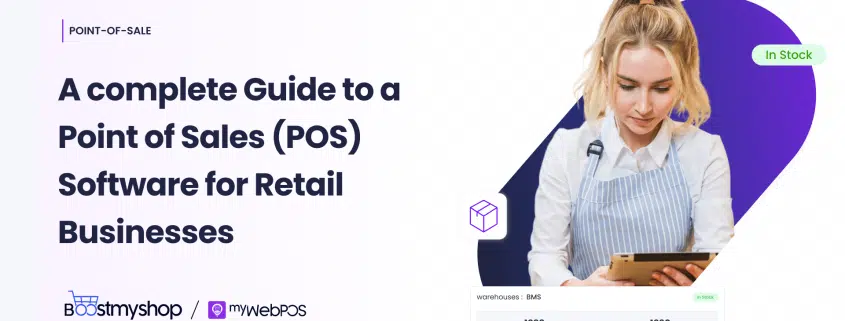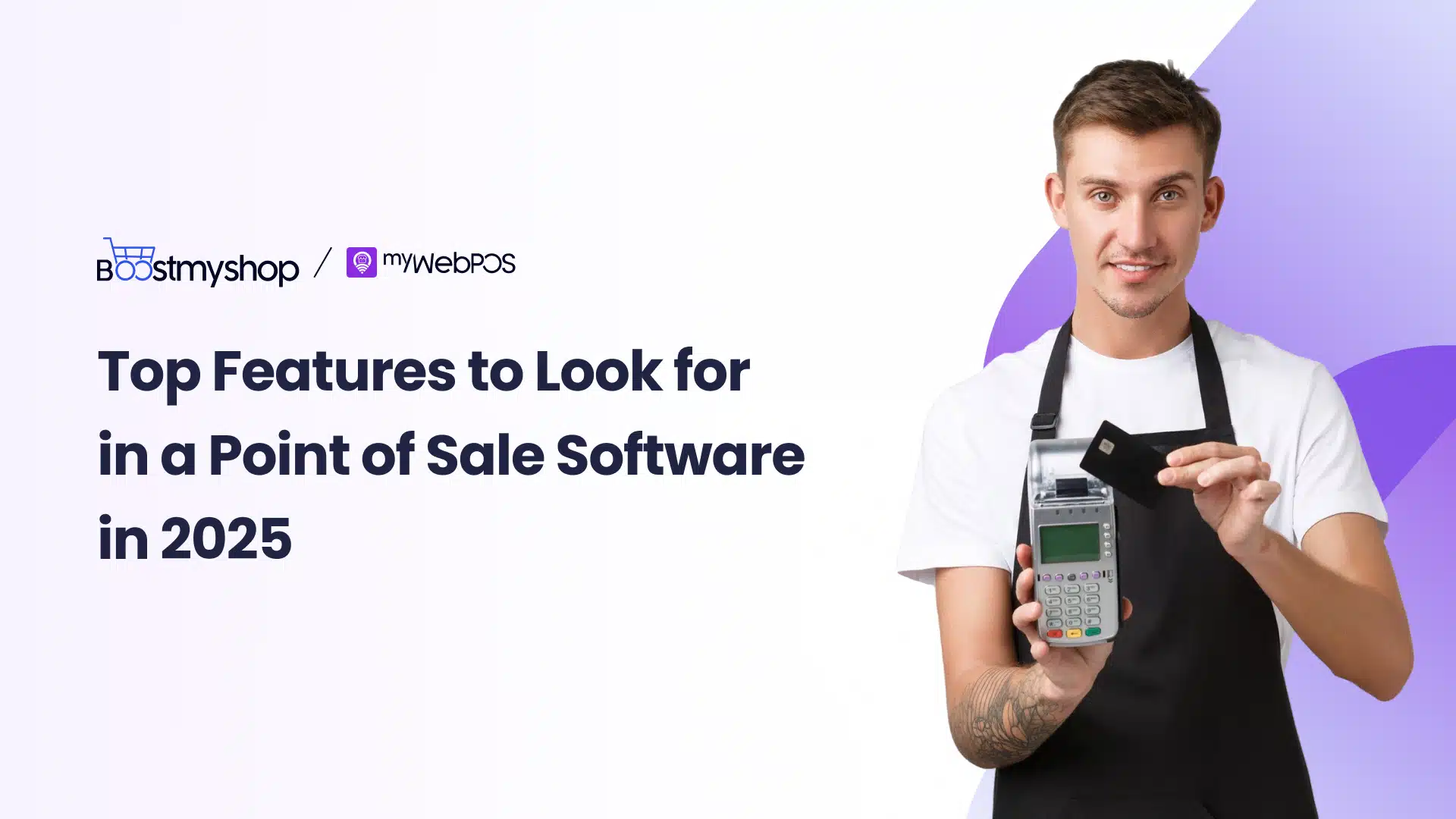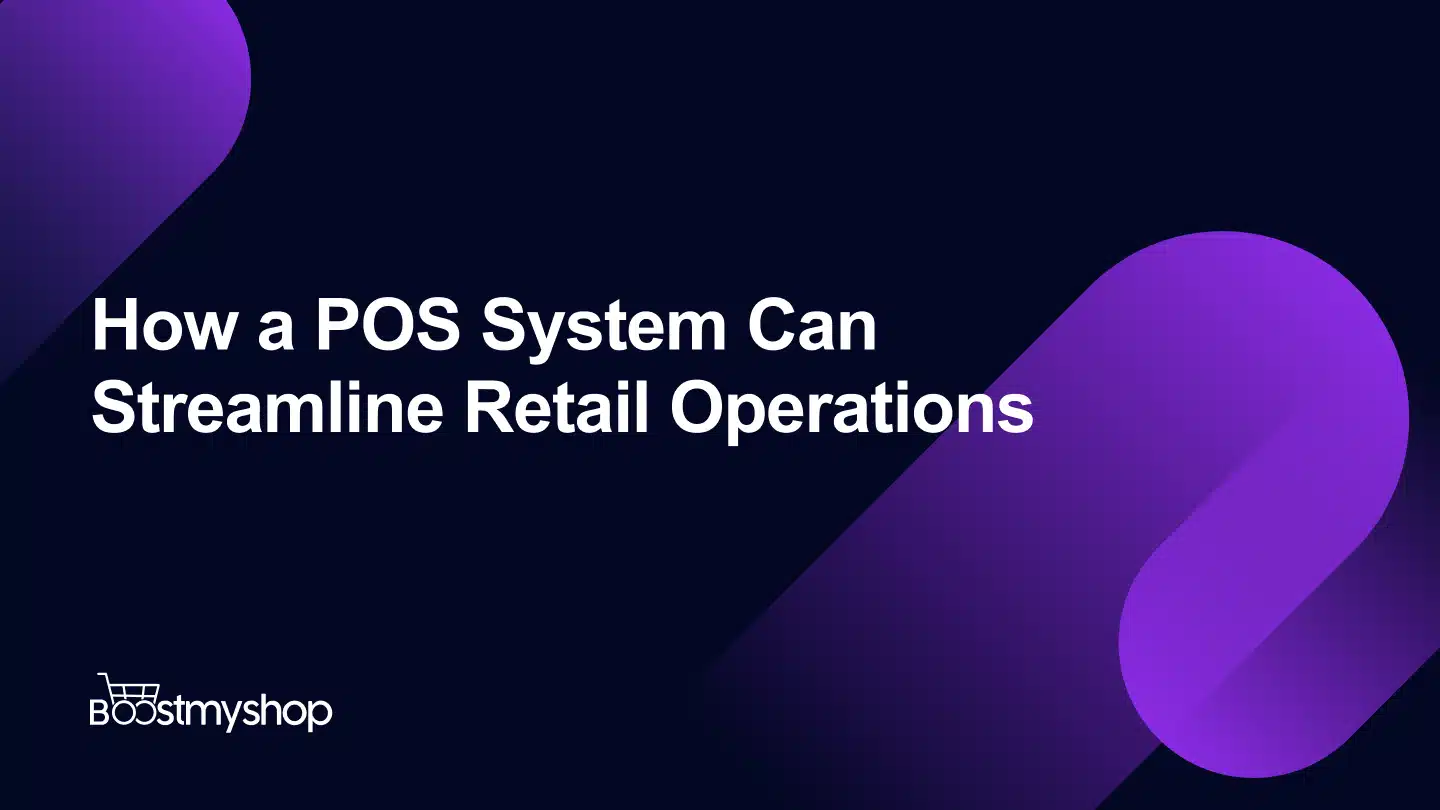A complete Guide to a Point of Sales (POS) Software for Retail Businesses
- Introduction
- What is a Point of Sales System?
- Type of Point of Sales Systems
- The Advantages of a POS System
- Point of Sales Features
- How a POS System Works
- Choosing the Right POS System
- Features of Boostmyshop’s MywebPOS
- How MywebPOS Can Help?
- Why Choose MywebPOS for Retail with MyFullfilment?
- Conclusion
Improving Retail Efficiency & Customer Satisfaction with Modern POS Systems
Overview
Technology plays a pivotal role in the success of modern retail businesses by enhancing efficiency and customer satisfaction. A Point of Sale (POS) system is essential for streamlining operations, automating tasks like transaction processing, inventory management, and customer insights.
According to studies, over 79% of retail businesses that adopted modern POS systems saw significant improvements in efficiency and customer satisfaction within their first year.
Modern Point of Sale (POS) systems go far beyond traditional cash registers-they streamline a variety of operations such as sales transactions, inventory management, customer tracking, and even analytics. By automating these tasks, POS systems help businesses reduce errors, save time, and improve overall efficiency.
The right POS system also provides retailers with real-time data, allowing them to make informed decisions, optimize inventory, and manage multiple sales channels seamlessly. MywebPOS, offered by Boostmyshop, is designed to help businesses do exactly that. With features like real-time inventory synchronization, multi-channel integration and advanced reporting, MywebPOS empowers businesses to handle transactions smoothly, regardless of the complexity.
This guide will walk you through the essential aspects of POS systems-helping you understand their features, benefits, and how to choose the ideal POS software for your specific retail needs. Whether you’re new to POS systems or looking to upgrade, this comprehensive resource will provide you with everything you need to make an informed decision.
What Is a POS System?
A Point of Sale (POS) system is the heart of retail operations, combining both hardware and software to manage transactions, track inventory, and provide insights into customer behavior. At its core, the POS system facilitates seamless sales processing but its true value is realized when integrated with other e-commerce tools like inventory management, customer relationship management (CRM), and data analytics platforms.
Types of POS Systems
Key Benefits of Cloud-Based POS Systems
- Remote access to data
- Scalable as your business grows
- Lower upfront costs and maintenance needs
On-Premise POS Systems
On-premise systems are installed and maintained on local servers. While they offer more control and do not require internet connectivity for day-to-day operations, they come with higher initial costs and require dedicated IT resources for maintenance and updates.
Key Benefits of On-Premise POS Systems:
- Full data control
- No reliance on internet connectivity
- Higher initial cost but no ongoing subscription fees
Mobile POS (mPOS)
Mobile POS systems are perfect for businesses that need flexibility on the go, such as pop-up shops, mobile vendors, or retailers operating in multiple locations. These systems run on smartphones or tablets, offering easy portability and quick setups. They’re becoming an essential tool for retail environments that demand fast, efficient transactions in a variety of settings.
Key Benefits of Mobile POS (mPOS):
- Ideal for mobile vendors and pop-ups
- Lower investment by leveraging existing mobile devices
- Quick to deploy
Omnichannel POS Systems
An omnichannel POS integrates both your online and offline sales channels into one cohesive platform. This means whether a customer shops in-store, on your website, or through an app, the experience is seamless, with real-time inventory synchronization across all platforms.
Key Benefits of Omnichannel POS Systems:
- Streamlined customer experience across all channels
- Unified view of inventory and sales
- Centralized management of both in-store and online sales
Choosing the right POS system depends on your specific business needs, whether you’re managing a brick-and-mortar store or an omnichannel operation. Here are the primary types:
Cloud-Based POS Systems Cloud-based solutions offer flexibility and scalability, ideal for businesses that want to access their data from anywhere. These systems are continuously updated and can easily integrate with various third-party applications, from inventory management tools to CRM systems. They’re an excellent option for businesses aiming for growth without significant upfront investments.
Key Features to Look for in a POS System
When evaluating POS systems for your business, several core features are non-negotiable. These functionalities go beyond processing payments-they ensure your retail operations run smoothly and efficiently.
Real-Time Inventory Management A POS system should integrate seamlessly with inventory tracking, ensuring that stock levels are updated in real time as items are sold. This integration helps prevent overstocking or stockouts, making it easier to manage your inventory across different sales channels.
Comprehensive Sales Reporting Data-driven decision-making is at the core of modern retail. A good POS system should provide detailed sales reports that highlight trends, customer preferences, and profitability. These insights help optimize everything from pricing strategies to inventory replenishment.
Customer Relationship Management (CRM) CRM features allow businesses to track customer behavior, manage loyalty programs, and offer personalized promotions. By maintaining a complete view of customer interactions, you can increase satisfaction and build long-term relationships.
Seamless Payment Processing A modern POS system should accept a wide variety of payment methods, including credit cards, mobile wallets, and contactless payments. With the rise of mobile payments, it’s essential to offer flexibility to customers to enhance the shopping experience.
Employee Management For retailers with a sizable staff, POS systems that include employee management tools can streamline scheduling, time tracking, and access control. This can help reduce payroll errors and improve staff productivity.
How a POS System Enhances the E-Commerce Experience
Improved Customer Experience A POS system provides a unified platform for managing customer interactions, whether in-store or online. By keeping customer profiles updated with purchase history and preferences, businesses can offer personalized experiences that foster loyalty and increase repeat business.
Integration with E-Commerce Platforms For retailers running online stores, choosing a POS that integrates with platforms like Shopify, WooCommerce, or Magento is essential. This integration allows you to manage inventory and sales data from both online and offline channels in one central system.
Advanced Analytics and Reporting A POS system that provides advanced reporting features gives you a deeper understanding of your business performance. From tracking sales by employee to monitoring inventory trends, these insights allow you to make informed decisions that drive growth.
Selecting the Right POS System for Your Business
The ideal POS system for your business depends on several factors:
- Size of Your Business: Larger businesses with multiple locations may benefit from a robust, on-premise or omnichannel POS system, while small to mid-sized businesses may find cloud-based or mobile POS systems more suitable.
- Integration with Other Systems: Consider how well the POS system integrates with your existing tools, such as e-commerce platforms, inventory management systems, and CRMs.
- Budget: While on-premise POS systems require a larger upfront investment, cloud-based and mobile solutions often come with lower initial costs and flexible pricing models.
- Scalability: Choose a system that can grow with your business. A cloud-based POS system can be especially beneficial for businesses that plan to expand.
Boostmyshop’s MywebPOS: The Perfect Solution for E-Commerce Retailers
MywebPOS is designed to meet the evolving needs of modern e-commerce businesses. With its seamless integration with MyFulfillment, it offers robust features to streamline inventory management and order fulfillment, ensuring that your retail operations run without a hitch.
Key Features of MywebPOS:
- Real-Time Inventory Updates: Keep your inventory synchronized across all sales channels.
- Detailed Analytics and Performance Tracking: Gain insights into your sales and operations to drive informed decisions.
- Integration with Major E-Commerce Platforms: Compatible with platforms like Shopify, Magento, and WooCommerce for seamless operations.
- Multi-Location Management: Manage multiple stores or warehouses efficiently under one system.
- Seamless Payment Processing and Customer Management Tools: Simplify transactions and enhance customer experiences.
With MywebPOS, e-commerce retailers can elevate their operations, ensuring smooth transactions and optimized inventory management while providing exceptional customer experiences.
Why Choose myWebPOS for Retail with myFulfillment?
Streamlined Operations for Efficiency
myWebPOS simplifies retail transactions with rapid cart creation, flexible payment options, and efficient return management, all integrated seamlessly with your inventory system.
Real-Time Inventory Management
Gain full control with live updates across all locations, ensuring accurate stock levels and optimized order fulfillment, whether online or in-store.
Flexible Fulfillment Solutions
With options like “Buy Now, Ship Later” or “Online Purchase, In-Store Pickup,” myWebPOS adapts to your business model, enhancing customer satisfaction and sales.
Enhanced Integration with myFulfillment
When paired with myFulfillment, myWebPOS takes your operations to the next level. Unified management of sales, inventory, and fulfillment ensures smooth, scalable growth.
Simplified Multi-Store Management
Manage orders and stock across multiple locations, streamlining logistics and preventing stockouts or overstock issues.
Conclusion
In today’s competitive retail environment, a POS system is more than just a tool for processing transactions-it’s a vital part of a retailer’s tech stack. The right POS system can streamline your operations, improve your customer experience, and provide valuable data to fuel growth. Whether you’re running a brick-and-mortar store, an online shop, or an omnichannel business, a well-chosen POS system will be the cornerstone of your success.




 Automating Stock Management
Automating Stock Management